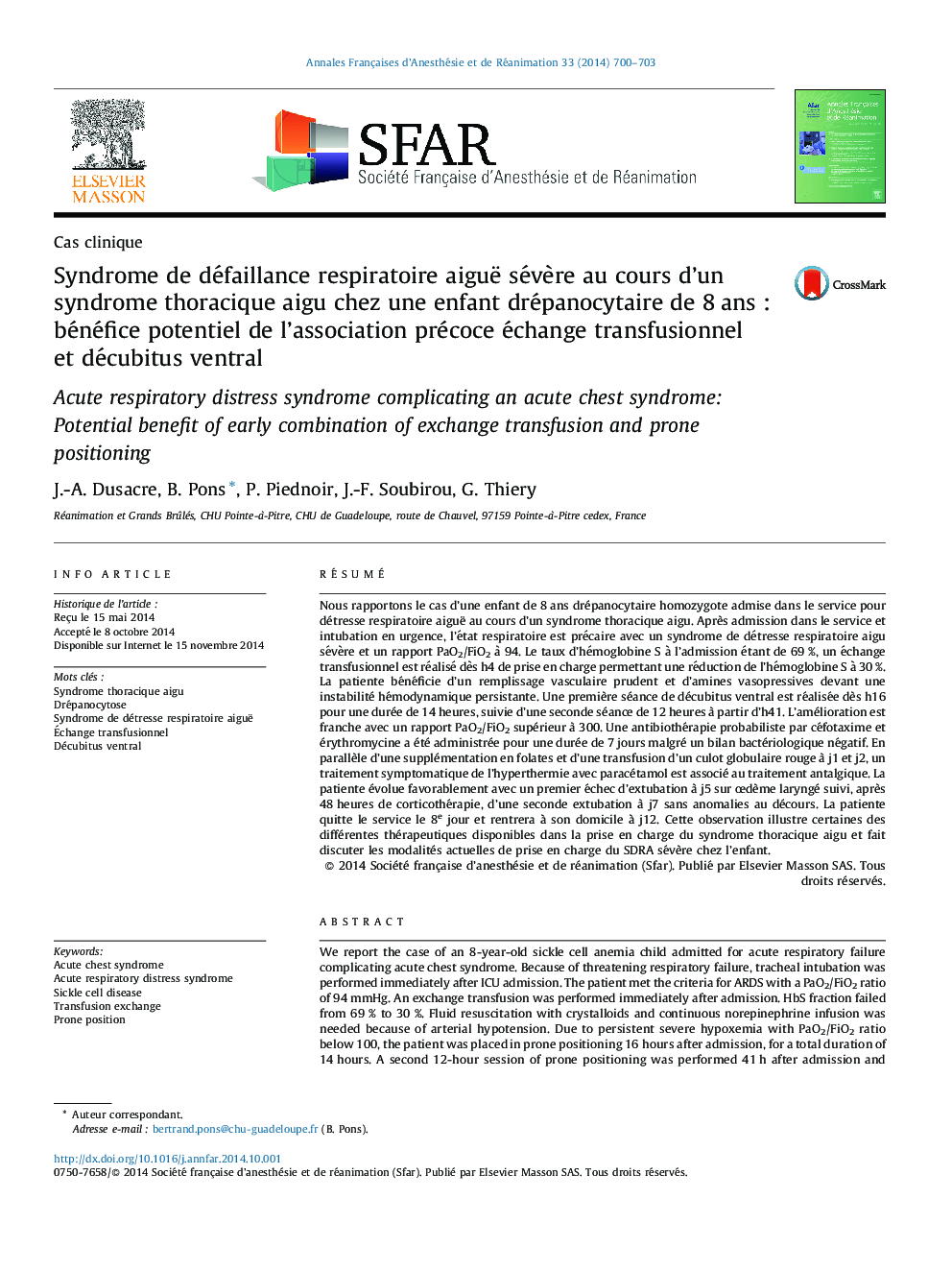| کد مقاله | کد نشریه | سال انتشار | مقاله انگلیسی | نسخه تمام متن |
|---|---|---|---|---|
| 2745172 | 1567177 | 2014 | 4 صفحه PDF | دانلود رایگان |

RésuméNous rapportons le cas d’une enfant de 8 ans drépanocytaire homozygote admise dans le service pour détresse respiratoire aiguë au cours d’un syndrome thoracique aigu. Après admission dans le service et intubation en urgence, l’état respiratoire est précaire avec un syndrome de détresse respiratoire aigu sévère et un rapport PaO2/FiO2 à 94. Le taux d’hémoglobine S à l’admission étant de 69 %, un échange transfusionnel est réalisé dès h4 de prise en charge permettant une réduction de l’hémoglobine S à 30 %. La patiente bénéficie d’un remplissage vasculaire prudent et d’amines vasopressives devant une instabilité hémodynamique persistante. Une première séance de décubitus ventral est réalisée dès h16 pour une durée de 14 heures, suivie d’une seconde séance de 12 heures à partir d’h41. L’amélioration est franche avec un rapport PaO2/FiO2 supérieur à 300. Une antibiothérapie probabiliste par céfotaxime et érythromycine a été administrée pour une durée de 7 jours malgré un bilan bactériologique négatif. En parallèle d’une supplémentation en folates et d’une transfusion d’un culot globulaire rouge à j1 et j2, un traitement symptomatique de l’hyperthermie avec paracétamol est associé au traitement antalgique. La patiente évolue favorablement avec un premier échec d’extubation à j5 sur œdème laryngé suivi, après 48 heures de corticothérapie, d’une seconde extubation à j7 sans anomalies au décours. La patiente quitte le service le 8e jour et rentrera à son domicile à j12. Cette observation illustre certaines des différentes thérapeutiques disponibles dans la prise en charge du syndrome thoracique aigu et fait discuter les modalités actuelles de prise en charge du SDRA sévère chez l’enfant.
We report the case of an 8-year-old sickle cell anemia child admitted for acute respiratory failure complicating acute chest syndrome. Because of threatening respiratory failure, tracheal intubation was performed immediately after ICU admission. The patient met the criteria for ARDS with a PaO2/FiO2 ratio of 94 mmHg. An exchange transfusion was performed immediately after admission. HbS fraction failed from 69 % to 30 %. Fluid resuscitation with crystalloids and continuous norepinephrine infusion was needed because of arterial hypotension. Due to persistent severe hypoxemia with PaO2/FiO2 ratio below 100, the patient was placed in prone positioning 16 hours after admission, for a total duration of 14 hours. A second 12-hour session of prone positioning was performed 41 h after admission and PaO2/FiO2 ratio reached 300 mmHg after. Treatment also included transfusion of two red-cell pack on day 1 and 2 after admission in order to maintain hemoglobin level above 8 g/dL, and a daily folic acid supplementation. The control of hyperthermia was achieved by a systematic parenteral administration of paracetamol. Cefotaxime and erythromycine were continued until day 7 despite the negative results of all bacteriological samples. The outcome was favorable from day 3 and the patient met the criteria for extubation on day 5. A first attempt of extubation was performed on day 5, but re-intubation was required because of laryngeal edema. Steroids were given for 48 h and the patient was successfully extubated on day 7. She was discharged from the ICU on day 8, and from the hospital on day 12. We discuss the various treatments available for the management of acute chest syndrome and their actual relevance in acute respiratory distress syndrome in the absence of strong evidence-based guidelines in pediatric ARDS.
Journal: Annales Françaises d'Anesthésie et de Réanimation - Volume 33, Issue 12, December 2014, Pages 700–703